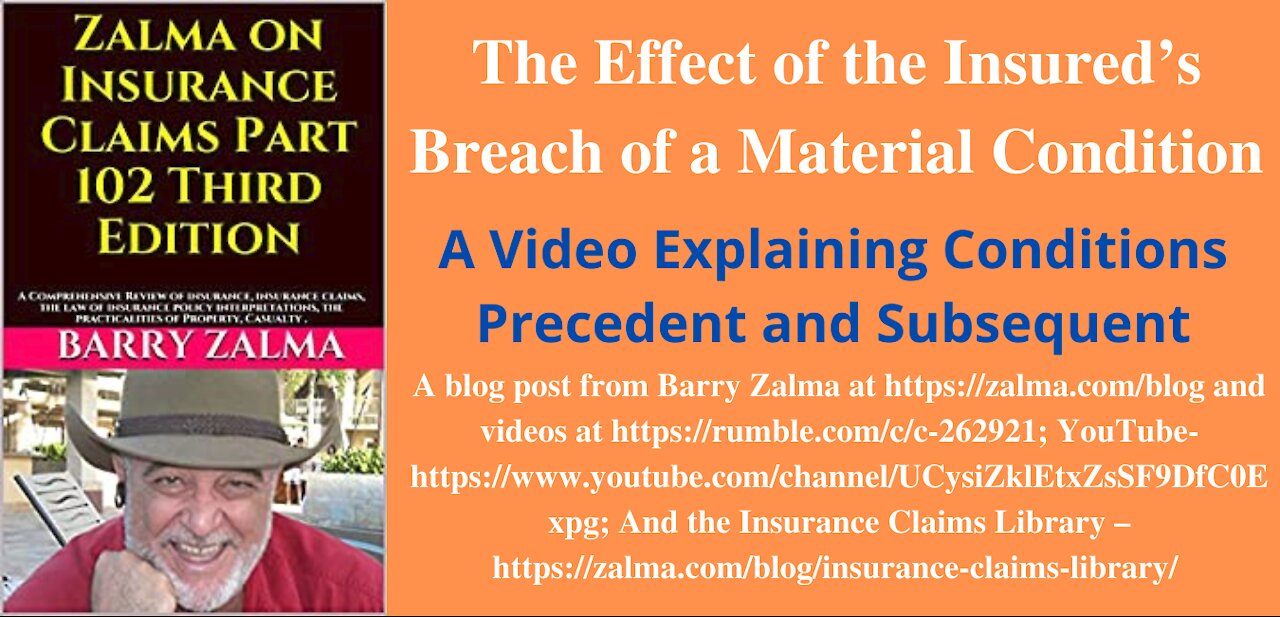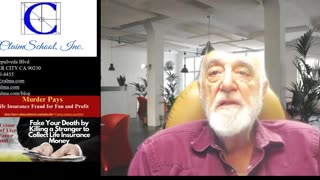Premium Only Content

A Video Explaining Conditions Precedent and Subsequent
The Effect of the Insured’s Breach of a Material Condition
As early as 1897, the Supreme Court of Pennsylvania, in Early v. Hummelstown Mut. Fire Ins. Co, 178 Pa 631, 36 A. 195 (1897) held that it is beyond all question that the plaintiff had forfeited all right of recovery on his policy at the time of the fire, by breaches of material conditions of the insurance contract.
A provision forbidding or limiting additional insurance is intended as a condition upon which the company assumes liability; and the law is well settled that, upon the breach of such a condition, there can be no recovery upon the contract in which it is contained. [Hiatt v. American Ins. Co., 109 S.E.2d 185, 250 N.C. 553 (N.C. 1959)]
Whether a condition precedent or subsequent, the courts of Missouri, in a number of decisions, have held uniformly that a stipulation restricting concurrent insurance is a warranty presumed in law to be material to the risk and that any substantial breach of such warranty ipso facto would work a forfeiture. [Harwood v. National Union Fire Ins. Co., 156 S.W. 475, 170 Mo. App. 298 (Mo. App. 1913)]
Under Louisiana law, an insured’s compliance with the provisions of an insurance policy is a condition precedent to recovery. Therefore, an insured’s failure to cooperate may be held to be a material breach of the policy and a defense to an insured’s lawsuit on the policy. More particularly, an insured’s failure to submit to an examination under oath or its refusal to produce requested documentation may violate the policy’s cooperation clause. A failure to cooperate precludes recovery when the insured engages in a “protracted, willful, and apparently bad faith refusal” to comply with a cooperation clause. [LeBlanc v. Davis, 254 La. 439, 445-446 (1969); Lee v. United Fire & Cas. Co., 607 So.2d 685, 688 (La. App. 4th Cir. 1992); Kerr v. State Farm Fire & Cas. Co., 511 Fed. App’x 306, 307 (5th Cir. 2013); Hamilton v. State Farm Fire & Cas. Ins. Co., 477 Fed. App’x at 165; Lee v. United Fire & Cas. Co., 607 So.2d at 688).
The failure to appear for a duly scheduled Independent Medical Exam or Examination Under Oath (EUO) voids no-fault coverage under the policy ab initio. [Unitrin Advantage Ins. Co. v Dowd, 143 NYS3d 543 [1st Dept 2021] The failure to appear for an EUO that was requested in a timely fashion by the insurer is a breach of a condition precedent to coverage and voids the policy ab initio. [Unitrin Advantage Ins. Co., 82 AD3d at 560; Alsaad Med., P.C. v. State Farm Mut. Auto. Ins. Co., 2021 NY Slip Op 50532(U) (N.Y. Civ. Ct. 2021)]
In Motiva Enterprises, LLC v. St. Paul Fire and Marine Insurance Co., 445 F.3d 381 (5th Cir. 03/28/2006), the Fifth Circuit Court of Appeal found that Texas requires a finding of prejudice for denial even when an insured breaches a material condition of a policy.
The Fifth Circuit noted the Texas Supreme Court’s decision in State Farm Lloyds Ins. Co. v. Maldonado, 963 S.W.2d 38 (Tex. 1998) where the issue of prejudice was never mentioned. In Maldonado, State Farm tendered a defense with a reservation of rights to its insured, Robert, who had been sued for defamation by a former employee, Maldonado. When State Farm would not pay Maldonado’s settlement demand, Maldonado and Robert entered into a private agreement in which Maldonado discharged Robert from further personal liability for Maldonado’s damages. Robert, no longer having any incentive to contest the defamation claim at trial, failed to actively defend the claim through his attorney provided by State Farm. He did not present any evidence, cross-examine any witnesses, or present opening or closing arguments.
ZALMA OPINION
As I have said many times, an insurance policy is a contract. It contains multiple conditions, both precedent and subsequent, which are promises made by the insured to the insurer to act in good faith when obtaining the policy or presenting a claim. If they fail to fulfill a condition or a warranty the insured, by breaking the promises made, they give up the right to any of the benefits of the policy.
© 2021 – Barry Zalma
Barry Zalma, Esq., CFE, now limits his practice to service as an insurance consultant specializing in insurance coverage, insurance claims handling, insurance bad faith and insurance fraud almost equally for insurers and policyholders.
He also serves as an arbitrator or mediator for insurance related disputes. He practiced law in California for more than 44 years as an insurance coverage and claims handling lawyer and more than 54 years in the insurance business.
Subscribe to Excellence in Claims Handling at https://barryzalma.substack.com/welcome.
He is available at http://www.zalma.com and [email protected]. Mr. Zalma is the first recipient of the first annual Claims Magazine/ACE Legend Award. Over the last 53 years Barry Zalma has dedicated his life to insurance, insurance claims and the need to defeat insurance fraud. He has created the following library of books and other materials to make it possible for insurers and their claims staff to become insurance claims professionals.
Go to training available at https://claimschool.com; articles at https://zalma.substack.com, the podcast Zalma On Insurance at https://anchor.fm/barry-zalma; Follow Mr. Zalma on Twitter at https://twitter.com/bzalma; Go to Barry Zalma videos at https://www.rumble.com/zalma ; Go to Barry Zalma on YouTube- https://www.youtube.com/channel/UCysiZklEtxZsSF9DfC0Expg; Go to the Insurance Claims Library – https://zalma.com/blog/insurance-claims-library/ The last two issues of ZIFL are available at https://zalma.com/zalmas-insurance-fraud-letter-2/ podcast now available at https://podcasts.apple.com/us/podcast/zalma-on-insurance/id1509583809?uo=4
-
 13:02
13:02
Barry Zalma, Inc. on Insurance Law
1 year agoMurder Pays
4401 -
 1:09:35
1:09:35
The White House
3 hours agoPresident Trump Participates in a Call with Service Members
15.6K34 -
 LIVE
LIVE
a12cat34dog
2 hours agoHAPPY THANKSGIVING - I APPRECIATE YOU ALL SO MUCH {18+}
114 watching -
 24:55
24:55
Jasmin Laine
1 day agoCarney BRAGS About ‘Investment’—Poilievre Drops a FACT That Stops the Room
12.9K18 -
 LIVE
LIVE
SIM_N_SHIFT GAMING
1 hour agoGRAND THEFT AUTO WITH FRIENDS
52 watching -
 6:43:27
6:43:27
VikingNilsen
11 hours ago🔴LIVE - VIKINGNILSEN - THE NEW PRELUDE - SOULFRAME
5.32K -
 7:45
7:45
Colion Noir
1 day agoThey Made Glock “Unconvertible” To Please Politicians, Guess What The Internet Did?
13.7K22 -
 23:42
23:42
The Kevin Trudeau Show Limitless
1 day agoThe Brotherhood’s Ancient Mirror Code Revealed
15.8K8 -
 11:21
11:21
Degenerate Jay
1 day ago $6.96 earnedSilent Hill's New Movie Could Be A Bad Idea...
22.3K3 -
![[Ep 801] Dems Setup & Disgusting Response to DC Tragedy | Giving Thanks With Rush](https://1a-1791.com/video/fwe2/79/s8/1/2/t/F/D/2tFDz.0kob-small-Ep-801-Dems-Setup-and-Disgu.jpg) 3:19:35
3:19:35
The Nunn Report - w/ Dan Nunn
6 hours ago[Ep 801] Dems Setup & Disgusting Response to DC Tragedy | Giving Thanks With Rush
15K9